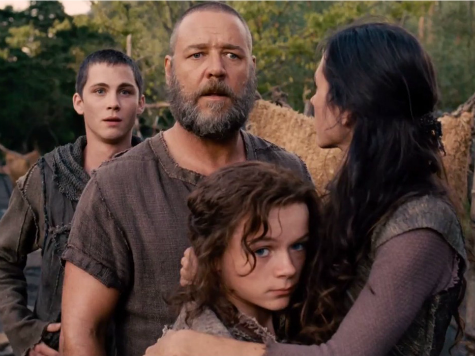
For those eager to be outraged by director Darren Aronofsky’s Noah, the film does not disappoint.
You’ll see flashes of environmentalism in a story traditionally meant to move the faithful, not proselytize for the modern green movement. Expect a few PETA-approved messages as well as the total lack of the word “God.”
In Hollywood speak, “Creator” is sufficient.
Yet Noah resists easy demonization as the enviro-screed people of faith feared. It is beautifully acted and carries a message of mercy more substantial than its petty green pieties. Ultimately, those themes echo much louder than the director’s wish to transform the story into a progressive club with which to smite those who don’t subscribe to climate alarmism. It won’t nudge aside classic tales like The Ten Commandments, but that was likely never the intention.
Russell Crowe plays Noah, a soulful man trying to protect his family from a harsh world. Noah receives images in his dreams of a monumental flood, messages from his Creator that water will cleanse the earth of its wickedness. And it’s up to him to save the innocents–the animals–while allowing humanity to get a second chance via his nuclear family.
Creating a vessel to protect both his family and the wilderness creatures won’t be easy. Noah is aided by stone creatures called the Watchers, fallen angels coaxed into doing Noah’s bidding. For all the money poured into the project, both the CGI animals and the craggly-faced Watchers prove B-grade at best.
When the flooding begins, the locals desperately want a seat on Noah’s ark, setting off a battle sequence that would fit snugly into a Lord of the Rings sequel.
Aronofsky follows the basic beats of the source material but takes enormous creative liberties along the way. The text itself isn’t long enough to sustain a feature-length film, so some of that is understandable. Yet movie goers may not embrace Crowe’s Noah despite the actor’s prodigious talent. He’s a man who turns on his family at one point, making him more of a villain than Ray Winstone’s loathsome character, a symbol of man’s willingness to run roughshod over the earth.
Noah includes snippets that will stop some movie goers cold. The warped souls who Noah must evade to keep him and his family safe eat meat of all things. They think it makes them strong, Noah tells his children. Tell that to Aronofsky alum Hugh Jackman who feasts on chicken breast whenever it’s time to bulk up for another Wolverine outing.
We also hear that the land is dying, even though Noah’s carbon footprint is smaller than that of a new born child. The Watchers, while heroic at times, apparently made an industrial-type of society that helped ruin the lands. And Noah at one point tells his child, “we only collect what we can use and what we need.”
These Al Gore-approved sequences occur very early in the film and are quickly discarded in favor of spectacle.
If Noah ultimately wins over skeptical, faith-based crowds it will be for the conversations it cannot help but start. How should Hollywood treat spiritual fare? Did Noah himself capture the forgiveness and love that speaks to millions of Christians worldwide? If a Biblical tale attracts a major film studio and heralded director, is that ultimately a win for the faithful assuming they treat the material with care?
Noah, alas, isn’t a great film no matter your spiritual stance. The story holds back on some of the emotional subtext too long, and the actors (including Emma Watson, Jennifer Connelly, Logan Lerman) aren’t given meaty enough roles to invest us in their fate.
Aronofsky’s Noah represents a tug of war between secular and spiritual instincts, created by a studio trying to please two distinct audiences. That battle yields an intermittently gripping story but one that also pulls its punches enough to sap its potential for greatness.

COMMENTS
Please let us know if you're having issues with commenting.